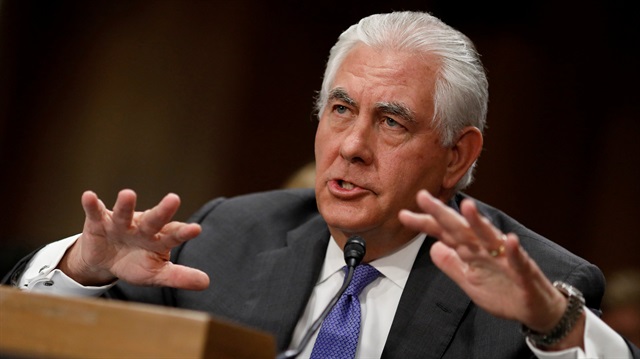
Washington working closely with Moscow, other parties to stabilize Syria in 'post-Daesh world'
The U.S. is looking to prevent another "outbreak of a civil war" between the Syrian regime and rebel groups after Daesh is defeated, Secretary of State Rex Tillerson said Tuesday.
"What we are hoping to avoid is the outbreak of a civil war, because you know what we really have is two conflicts in Syria: the war against ISIS and the civil war that created the conditions for ISIS to emerge," Tillerson said at a State Department news briefing, referring to the Islamic State of Iraq and Syria, or Daesh.
"We're working closely with Russia and other parties to see if we can agree on a path forward on how to stabilize Syria in the post-ISIS world," he added.
Turning to Asia, Tillerson said the U.S. is willing to sit down for talks with North Korea on the condition that they give up on their pursuit of nuclear weapons.
"We do not seek an excuse to send our military north of the 38th parallel. And we're trying to convey to the North Koreans that we are not your enemy. We're not your threat. But you are presenting an unacceptable threat to us, and we have to respond," he said, referring to the North’s intercontinental ballistic missile program.
In response to a question about simmering tensions with Russia that just announced it is expelling 755 U.S. diplomats, Tillerson said terrorism is one area of mutual interest with Moscow and both countries are committed to the stability of Syria following the battle to defeat Daesh, but the relationship with Russia continues to be under 'considerable stress'.
Noting that relations between the two countries were at an historic low since the end of the Cold War, Tillerson said he would meet his Russian counterpart, Sergey Lavrov, next week to discuss ways to improve ties in light of the new Russian sanctions bill passed by the U.S. Senate.
"The action by Congress to put these sanctions in place and the way they did, neither the president nor I are very happy about that," Tillerson added.
The Senate last week approved new sanctions against Russia, Iran and North Korea that are now waiting for President Donald to sign into law.
The measures were passed by a vote of 98-2 and include sanctions against Russian officials in retaliation for their alleged interference in the 2016 presidential election and against Iran and North Korea in response to their weapons programs.


